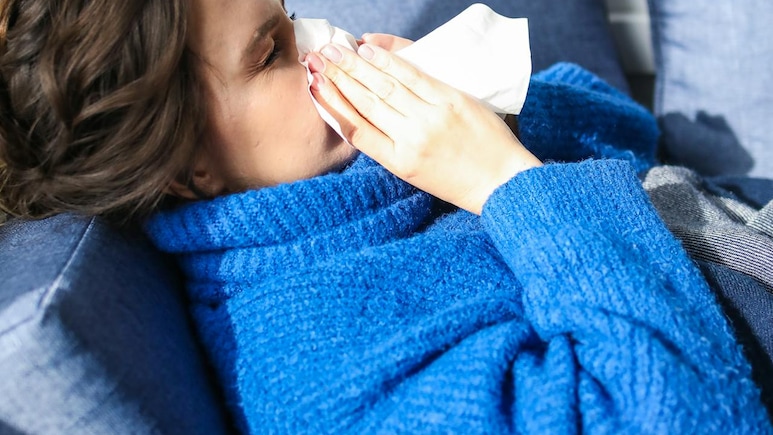
We usually blame coughs on colds or allergies, but air pollution is an increasingly common trigger especially in Indian cities during winter and post-Diwali smog. Tiny pollution particles and gases act like microscopic sand and chemical irritants: they inflame the airway lining, disrupt the tiny hair-like cilia that normally sweep mucus away, and increase mucus production. The result is a scratchy throat and a cough that can last days to weeks depending on exposure and individual sensitivity. Researchers have even measured that cough frequency rises soon after spikes in PM2.5 (fine particles), showing that exposure has an immediate effect, not just a long-term one. That's why many hospitals see surges in respiratory symptoms when the AQI goes bad. Below we discuss simple tips to help you manage cough during high air pollution.
Tips to help you manage cough from air pollution
1. Check AQI first
Use a reliable AQI app like AQI.IN. When the AQI is “poor” or worse, avoid outdoor exercise and heavy exposure, a short indoor walk is fine.
2. Mask up
A well-fitted N95/FFP2 mask filters PM2.5 far better than cloth masks. Wear it whenever you must be outside in high AQI, especially in traffic or near construction. Fit is the key as gaps let particles sneak in.
3. Create a ‘clean air corner' at home
Close windows during smog events and run an air purifier with a HEPA filter in the room you spend most time in. Even portable purifiers significantly lower indoor PM2.5 and reduce cough triggers. If a purifier is not possible, keep indoor plants and avoid indoor sources of smoke (stoves, incense, cigarettes).
4. Humidify smartly
Dry air and pollutants combine to irritate your throat. A humidifier (kept clean) or a bowl of water on the radiator adds gentle moisture, so mucus doesn't thicken and coughing eases. Don't overdo it, too humid invites mould.
5. Warm saline gargles and steam
Gargling with warm saline soothes inflamed throat lining. Short steam inhalation with hot water, towel over head from 5–10 minutes helps loosen mucus and reduce cough frequency. Use steam cautiously if you have asthma.
6. Drink smart
Stay hydrated as warm liquids like herbal teas, warm water with lemon can help thin mucus. Add soups (clear broths) and foods with natural expectorant properties, like ginger and tulsi, which soothe airways and may help clear phlegm.
7. Rescue medications
For those with asthma or COPD, keep quick-relief inhalers (short-acting bronchodilators) and controller medications as directed. If you cough heavily, a short course of a physician-prescribed cough suppressant or inhaled steroid may be needed but don't self-medicate.
8. Nasal hygiene
Regular saline nasal irrigation (neti pot or spray) removes trapped particulate matter from the nose and reduces post-nasal drip that can trigger cough. It's cheap, effective, and safe when done with clean (boiled/cooled or distilled) water.
9. Time your outdoor activity
In many cities, pollutant concentrations spike at night or during rush hours. When AQI is moderate, choose mid-day for short outdoor tasks; when bad, postpone non-essential outings.
10. Strengthen your lung resilience
Stop smoking, control indoor biomass smoke, maintain a healthy weight, and do breathing exercises (diaphragmatic breathing, pursed-lip breathing). Over time these measures reduce the severity of pollutant-triggered coughs and improve recovery.
Bad AQI doesn't just make eyes sting, it directly irritates, inflames and sometimes injures the airway, producing coughs that range from mild to severe. The fastest wins are exposure reduction via masks, purifiers, AQI-aware planning and simple airway care at home like hydration, saline, and steam. For persistent or severe coughs, combine these common sense steps with medical review, especially if you have underlying lung disease.
Disclaimer: This content including advice provides generic information only. It is in no way a substitute for a qualified medical opinion. Always consult a specialist or your doctor for more information. NDTV does not claim responsibility for this information.
References
Impact of environmental air pollution on respiratory health, NCBI : 2024.
Incidence of cough from acute exposure to fine particulate matter, NCBI : 2024.
Impact of particulate air pollution on airway injury and inflammation, NCBI : 2024.
Environmental pollutants damage airway epithelial cell cilia, NCBI : 2020.
Ambient (outdoor) air pollution: fact sheet, World Health Organization (WHO) : 2024.
Health Advisory on Air Pollution, National Centre for Disease Control / Ministry of Health & Family Welfare, India : 2023.
Environmental and Health Impacts of Air Pollution: A Review, Frontiers in Public Health : 2020.
Track Latest News Live on NDTV.com and get news updates from India and around the world

